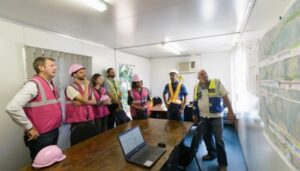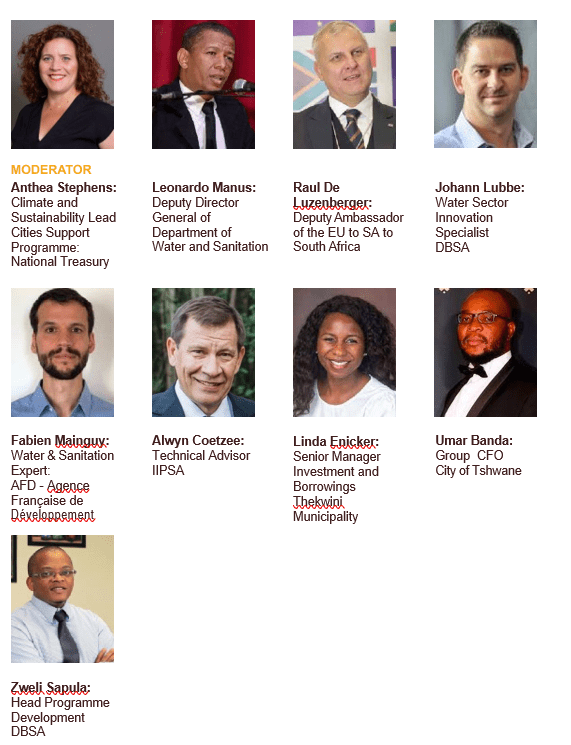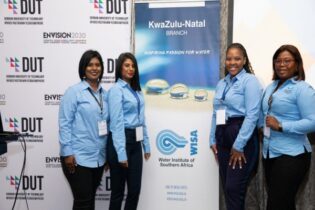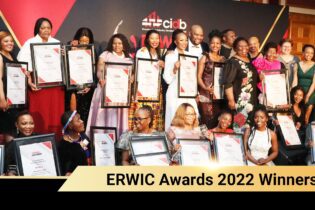Date: Thursday 17 March 2022
Time: 10:00-12:30
Format: Webinar
The European Union has a support programme for South Africa (SA) and the rest of the Southern African Development Community (SADC) region called the Infrastructure Investment Programme for South Africa (IIPSA). The purpose of IIPSA is to provide support to develop the SA Government’s national and regional development and infrastructure plans. This is achieved by providing grant funding in support of loans from participating Development Finance Institutions (DFIs). The sectors to be supported by IIPSA include energy, transport, water, information, and communications technology (ICT) and social sectors. Funding from IIPSA includes capital/direct grants, interest rate subsidies, project preparation grants, technical assistance and guarantees. The Development Bank of Southern Africa (DBSA), National Treasury (NT) and the European Union (EU) will jointly host a webinar to showcase some of the success stories in addressing SA’s water challenges through IIPSA. The webinar will take place on Thursday, 17 March 2022 at 10:00-12:30 SAT.WEBINAR REGISTRATION: https://us06web.zoom.us/webinar/register/WN_GW0xfdjMR6-ftqsAvc9dUQ
The DBSA is developing and implementing the National Water Programme for SA. This is to support the entire water value chain specifically in the municipal sector. In line with the DBSA’s infrastructure development strategy, capital will be deployed using programmatic and blended finance strategies.
The water programme will specifically address water re-use and non-revenue water supply, off-grid sanitation, rural water supply and is part of the water capital expenditure programme for SA. SA is ranked as the 30th driest country in the world and is regarded as water scares country. This situation is caused by several factors including, insufficient water infrastructure maintenance and investment, frequent droughts driven by climatic variation and unequal access to safe and reliable water and sanitation. According to the 2030 Water Resources Group, the country’s demand for water is expected to rise by 17.7 billion m³ in 2030 while water supply is projected to amount to 15 billion m³, signalling a projected 17% gap between water supply and demand. The DBSA has been appointed as fund manager and secretariate to the IIPSA and is working to address SA’s water infrastructure challenges. DBSA is working to address SA’s water infrastructure challenges by developing a National Water Programme. The programme seeks to crowd in public and private sectors while providing tangible solutions for different stakeholders, i.e. municipalities and other role-players in the water sector.PANEL MEMEBERS:
Key discussion points will include:
- The demand to invest in the water sector and to prioritise investment at national, provincial and local levels.
- Criteria for beneficiaries: Provinces, municipalities and the private sector.
- Need for blended funding and the role of the private sector and mobilising of soft/grant capital to credit enhance projects and institutions to raise long term debt.
- Role of development banks and partners like the EU.
| Time | Item | Person |
| 10:00 | Introductions and welcome remarks Setting the scene and contextualising the discussion Encourage a sense of shared responsibility for the management of water infrastructure and resources | Anthea Stephens: Climate and Sustainability Lead, Cities Support Programme: National Treasury |
| 10:15 | Perspective on the SA Water Sector: SA and the region have many challenges to address the water needs and challenges to address the infrastructure needs. Maintenance of existing infrastructure and to build new infrastructure is critical to supply the increased demand from a growing population. The institutional and financial capacity is not always available to address these needs. Solutions must be found to address these infrastructure needs from public and private sectors. | Leonardo Manus: DDG Department of Water and Sanitation |
| 10:30 | Contextual significance of collaboration in addressing water challenges specifically in developing markets. | Deputy Ambassador of the EU to SA: Mr Raul de Luzenberger |
| 10:45 | Building a programmatic approach to solve SA’s water challenges A programmatic approach must be developed to address the water challenges in a comprehensive and prioritised manner to mobilise available resources in the best way possible Bottlenecks and solutions around tariffs to crowd in investorsRepayable finance – how it applies in the water sector Restrictions on the flow of funds | Johann Lubbe: Water and Innovation Specialist: DBSA |
| 11:00 | EU’s experience in assisting developing countries EU experience in the water sector with special focus on SADCProgrammes in the pipeline from the EU to support the water sector in the region Primary focus areas to be supported from the EU/IIPSA programme | Fabien Mainguy: Water and Sanitation Expert/EU Task Team Leader |
| 11:15 | The successful roll-out of the current IIPSA programme by DBSA under the supervision of the EU and NT. The programme objectives such as financial leveraging, innovative financing by blending of IIPSA grants to achieve leverage effect. This enables the implementation of bigger projects with greater impact Positive additional results that the IIPSA grant achieved above and beyond what could have been achieved without the grantEight projects to be showcased in which IIPSA invested in | Alwyn Coetzee: IIPSA Technical Advisor |
| 11:30 | The City of eThekwini benefited from IIPSA grant and interest subsidy funding. Value created through IIPSA funding in the role out of Western and Eastern AqueductsReflection on the contribution IIPSA made to the successful roll-out of the Aqueducts programme to raise capital. | Linda Enicker: Chief Investments Officer |
| 11:45 | The City of Tshwane received project preparation assistance in doing the feasibility for a Water Conservation/Water Demand Management (WC/WDM). This is a multi-year water programme. The next step is to implement the programme. How can soft money assist in the rollout of the programme. This programme has a great potential to be replicated in other metros and municipalities. | Umar Banda: Group CFO City of Tshwane |
| 12:00 | Questions and answers from the audience | Moderator – Anthea Stephens |
| 12:30 | Summary and closing remarks | Zweli Sapula: Head Programme Development: DBSA |








